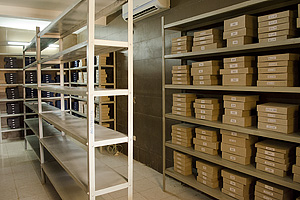Measures
The urgent evacuation of the Timbuktu manuscripts, their inadequate conditions of storage in Bamako, and the change from dry to more humid climate conditions, have all had an adverse effect on the manuscripts. In order to prevent their further deterioration, several emergency measures have been implemented under recommendation of SAVAMA-DCI and CSMC and with the financial support of LuxDev, the Gerda Henkel Foundation, the German Federal Foreign Office and the Swiss Federal Department of Foreign Affairs.
Protection against Humidity

As the manuscripts were evacuated from Timbuktu, their internal humidity was very low because they had been stored in the desert environment of that city. Due, however, to increasing ambient humidity, they began to suffer from swelling and distortion. Poor air circulation and increased humidity in the metal chests created a high risk of mould infestation. Mould develops quickly at a humidity level of 65% and above, and in August the humidity in Bamako reached 75%.
The first step towards fending off humidity and keeping it at the optimal 50% level was installation of dehumidifiers in the temporary storage locations in Bamako. Sixteen mobile dehumidifiers were purchased by the German project and the Swiss Federal Department of Foreign Affairs and shipped to Bamako where they were subsequently installed under the supervision of Eva Brozowsky. To absorb excess moisture accumulated during the first months of the manuscripts’ exile in Bamako, silica gel packets were put into the metal chests.
